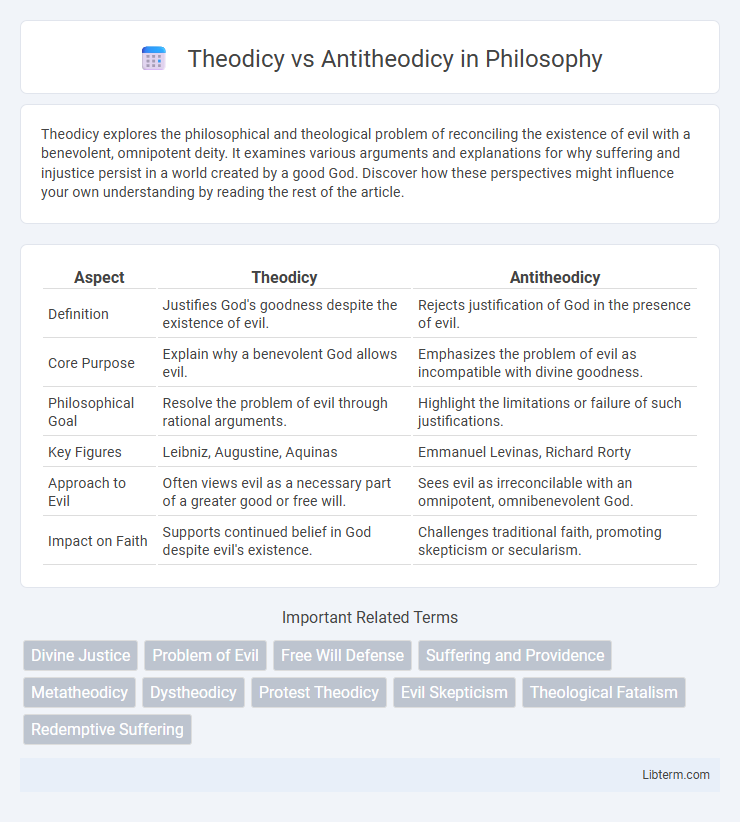Theodicy explores the philosophical and theological problem of reconciling the existence of evil with a benevolent, omnipotent deity. It examines various arguments and explanations for why suffering and injustice persist in a world created by a good God. Discover how these perspectives might influence your own understanding by reading the rest of the article.
Table of Comparison
| Aspect | Theodicy | Antitheodicy |
|---|---|---|
| Definition | Justifies God's goodness despite the existence of evil. | Rejects justification of God in the presence of evil. |
| Core Purpose | Explain why a benevolent God allows evil. | Emphasizes the problem of evil as incompatible with divine goodness. |
| Philosophical Goal | Resolve the problem of evil through rational arguments. | Highlight the limitations or failure of such justifications. |
| Key Figures | Leibniz, Augustine, Aquinas | Emmanuel Levinas, Richard Rorty |
| Approach to Evil | Often views evil as a necessary part of a greater good or free will. | Sees evil as irreconcilable with an omnipotent, omnibenevolent God. |
| Impact on Faith | Supports continued belief in God despite evil's existence. | Challenges traditional faith, promoting skepticism or secularism. |
Understanding Theodicy: Defining the Problem
Theodicy addresses the problem of evil by attempting to reconcile the existence of a benevolent, omnipotent God with the presence of suffering and injustice in the world. It explores philosophical and theological frameworks that justify or explain why evil exists despite divine goodness. Antitheodicy rejects these justifications, arguing that the reality of evil cannot be morally or logically reconciled with the concept of a just and all-powerful deity.
The Roots of Theodicy in Religious Thought
Theodicy, rooted in religious traditions, seeks to reconcile the existence of evil with a benevolent, omnipotent deity, often drawing from scriptural and philosophical foundations in Judaism, Christianity, and Islam. Key figures like Augustine and Leibniz formulated arguments emphasizing divine justice and the soul-making process, addressing the problem of suffering within a theological framework. Antitheodicy challenges these explanations by rejecting the possibility of justifying evil through divine purposes, emphasizing human experience of injustice and advocating for a God-free ethics or a silent deity concept.
Key Arguments Supporting Theodicy
Theodicy defends the existence of an all-powerful, benevolent God despite the presence of evil by arguing that evil serves a greater purpose such as soul-building, free will, or moral growth. Key arguments emphasize that suffering allows humans to develop virtues like courage and empathy, which would be impossible in a world without challenges. Theodicy maintains that divine justice may be inscrutable but ultimately exists to reconcile God's goodness with worldly suffering.
Introducing Antitheodicy: A Critical Response
Antitheodicy challenges traditional theodicy by rejecting any justification of divine goodness in the presence of evil and suffering, emphasizing the moral and philosophical implications of unexplainable suffering. It critiques theodicy's attempt to reconcile God's omnipotence and benevolence with evil, arguing that such attempts may inadvertently legitimize injustice and pain. Antitheodicy redirects the discourse towards acknowledging suffering without offering theological rationalizations, fostering a more honest engagement with the problem of evil.
Core Principles of Antitheodicy
Antitheodicy challenges the traditional theodicy framework by rejecting attempts to justify divine goodness in the presence of evil, emphasizing the irreconcilable conflict between suffering and a benevolent deity. Core principles of antitheodicy include the refusal to explain or rationalize evil as part of a divine plan, advocating for a truthful acknowledgment of suffering without theological mitigation. This approach underscores human experience and moral responsibility, focusing on confronting and resisting evil rather than offering metaphysical justifications.
Philosophical Debates: Theodicy vs Antitheodicy
Philosophical debates surrounding theodicy versus antitheodicy center on the justification of evil in the presence of an omnipotent, benevolent God contrasted with outright rejection of such justification. Theodicy attempts to reconcile suffering and divine justice by proposing reasons for evil, such as free will or soul-making, while antitheodicy critiques these efforts as inadequate, emphasizing the moral and existential implications of suffering without rationalization. Key figures like Gottfried Wilhelm Leibniz advocated for theodicy, whereas thinkers such as Emmanuel Levinas and Richard Williamson challenge its premises, highlighting the persistent tension in philosophical theology.
Theodicy’s Role in Contemporary Theology
Theodicy plays a crucial role in contemporary theology by addressing the problem of evil and justifying God's goodness despite suffering and injustice. It seeks to reconcile divine omnipotence and benevolence with the existence of evil through philosophical and theological explanations. This constructive approach contrasts with antitheodicy, which rejects justifications and emphasizes the limitations of human understanding in the face of divine mystery.
Antitheodicy and the Ethics of Suffering
Antitheodicy challenges the justification of suffering by rejecting the attempt to reconcile evil with divine goodness, emphasizing the ethical importance of acknowledging pain without rationalizing it. This perspective advocates for bearing witness to suffering and promoting solidarity with victims rather than offering theological explanations that might diminish their experience. Ethical responses under antitheodicy prioritize empathy and justice over traditional theodical narratives that can inadvertently justify or normalize suffering.
Real-World Implications: Faith, Doubt, and Justice
Theodicy addresses the problem of evil by defending God's justice and goodness despite suffering, influencing believers to maintain faith and find meaning in adversity. Antitheodicy challenges these defenses by rejecting justifications of evil, often fostering doubt and prompting critical examination of religious doctrines and moral accountability. These contrasting views impact real-world responses to injustice, shaping how communities reconcile faith with ethical demands for justice and human suffering.
Ongoing Dialogues and Future Perspectives
The ongoing dialogues between theodicy and antitheodicy critically examine the problem of evil through contrasting frameworks: theodicy seeks to justify divine goodness amid suffering, while antitheodicy challenges the very premise of reconciling evil with a benevolent deity. Emerging perspectives explore interdisciplinary approaches, integrating philosophy, theology, and existential psychology to deepen understanding and critique of traditional models. Future discussions aim to transcend binary views, emphasizing pluralistic and contextual interpretations that address contemporary ethical and metaphysical concerns.
Theodicy Infographic

 libterm.com
libterm.com